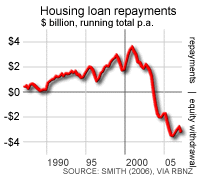RBNZ reveals scale of home equity withdrawal; sees reversal
Annual net housing equity withdrawals rose by over NZ$6 billion between 2001 and 2007, but the resulting spending spree is expected to reverse in coming years as house prices fall, a Reserve Bank of New Zealand economist said in a discussion paper.

Net housing equity withdrawals in the six year period rose from debt repayments and equity investments (or saving) of NZ$3 billion a year to equity withdrawals (or spending) of NZ$3 billion.
Home equity withdrawal is where a home owner either sells a house and buy a cheaper one, or where increases the mortgage on an existing house, depending on rising prices to lift home equity.
The paper by Reserve Bank economist Phil Briggs focused on how inheritances affected the level of housing equity withdrawals. It concluded that active influences on equity withdrawal such as the rise in house prices, rather than passive forms of withdrawal such as inheritance, were the main factors for the net NZ$6 billion rise.
“Admittedly, some of these other withdrawals would have involved the sale of properties where elderly owners were either downsizing or going into long term care; such withdrawals may be seen as not being particularly active. Nevertheless, it seems that most of the change in housing equity withdrawal occurred as a consequence of property owners making deliberate decisions to withdraw equity,” Briggs said.
As house prices rose between 2001 and 2006, so did inheritances. Higher house prices meant higher inheritances when a house was bequeathed and then sold.
Briggs calculated that over the period, the gross amount of inheritance from houses rose from NZ$1.41 billion in 2001 to NZ$2.89 billion, accounting for 29% of the NZ$5 billion change in net household equity withdrawals. This means 71% of the rise in equity withdrawals came in forms other than inheritance.
Just as the rise in house prices increased withdrawals of household equity, Briggs suggested that a fall in house prices would have the opposite effect.
“If house prices were to decline relative to household disposable income in the next year or so, then so would inheritances relative to household disposable income. In general, over time the inheritances to household disposable income ratio is likely to reflect the house price cycle,” Briggs said.
“Housing market conditions have changed recently, with house prices now starting to decline. This market change, together with changes in global credit conditions, has already resulted in tighter lending criteria being applied to people looking to take out mortgages. Furthermore, home owners themselves will be much less inclined to want to access the equity in their houses when that housing is not increasing in value.”
This article has kindly been republished courtesy of interest.co.nz. To view this article and other news updates from
Posted: 22 Dec 2008
News articles
Browse articles
by date


